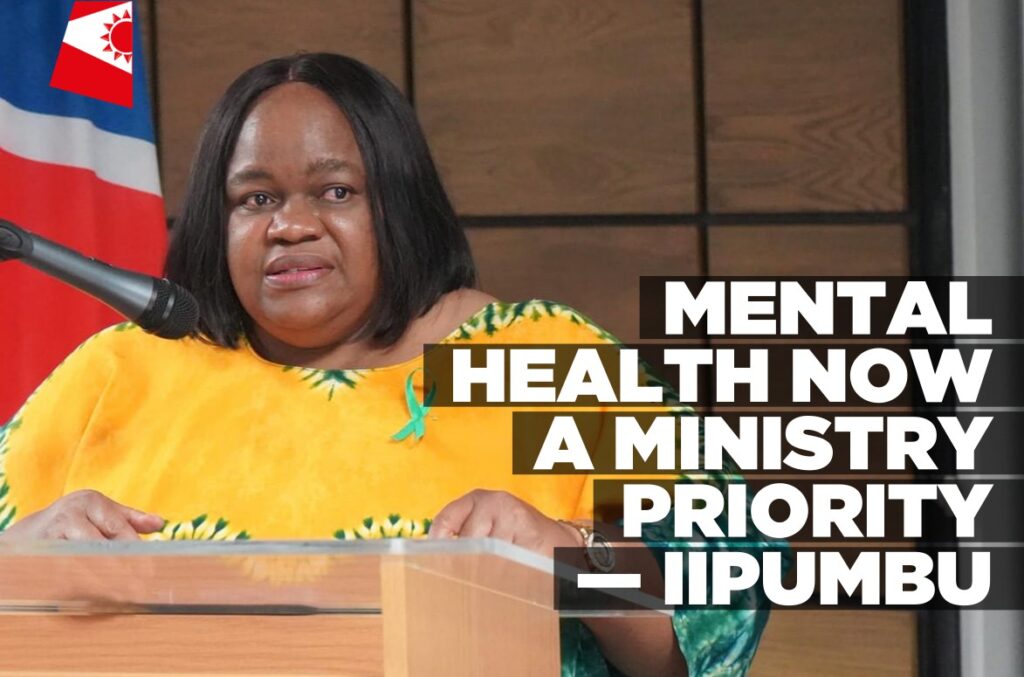Copyright web

Placido Hilukilwa MENTAL health is not a side issue. It is the engine room of performance, judgment, compassion, and dignity, said Lucia Iipumbu, the Minister of Home Affairs, Immigration, Safety and Security, when she addressed the ministerial mental health and suicide prevention awareness session in Windhoek. Iipumbu said that the session was not a ceremony but a turning point. “Today,” she said, “we gather not merely to exchange policy notes, but to look each other in the eye and affirm a simple, powerful truth: the people who secure our nation also deserve to feel safe within themselves. The uniforms we wear, the laws we enforce, the systems we administer — none of it functions without human beings whose minds and spirits are intact.” Photos: Ministry of Home Affairs, Immigration, Safety and Security According to Iipumbu, when the mind is overwhelmed, the consequences ripple through families, communities, and the workplace. “At its most tragic, mental distress ends in suicide — a loss that is always personal and, in so many cases, preventable. If we can mobilise entire national systems to protect our borders and our communities, surely we can mobilise heart, leadership, and practical tools to protect those who protect us,” she said, adding that for too long, silence and stigma have distorted people’s understanding. “Let us end the false story that ‘strong people don’t struggle.’ Strength is the courage to speak, to seek help, and to stand beside a colleague in difficult moments. From this day forward, let our Ministry be known as a place where vulnerability is not punished, but respected; where asking for help is treated as wisdom, not weakness; and where confidentiality and dignity are non-negotiable,” said the Minister. She pointed out that culture is not an accident; it is a choice — especially by those who lead. She therefore called on every manager and commander to set the weather of their teams. “Make time to check in. Notice who is unusually quiet or unusually sharp. Balance urgency with humanity. Ensure workloads are realistic. Plan for rest, rotation, and recuperation, especially for colleagues exposed to trauma — frontline officers, custodial staff, and those working with vulnerable populations. When your people know they are seen and valued, they will give their finest service to the nation,” she said. Iipumbu said that although not everyone is a clinician, everyone can be a first responder for another’s well-being. She urged the Ministry staff to learn the signs that a colleague may be struggling — things like sudden mood changes, increased absenteeism, declining performance, social withdrawal, talk of hopelessness or self-harm, or signs of substance misuse. Iipumbu suggested the use of the C.A.R.E. approach whenever a worrying sign is noticed: C – Check in: In private and with compassion: “I’ve noticed a change. Are you okay?”A – Ask & listen: Ask open questions and listen without judgment. Slow, attentive listening saves lives.R – Refer: Encourage professional support and offer to help with access — accompany them if needed.E – Escalate for safety: If there is an immediate risk, do not leave them alone. Seek emergency help at once. Iipumbu said that, beginning immediately, the Ministry will deepen a practical, sustained support architecture, which shall include emotional intelligence and trauma-informed training for managers and frontline staff, as well as mandatory debriefs after critical incidents. The Executive Director will engage the Ministry of Health and Social Services to establish on-site and virtual counselling options — especially for correctional and police officers working with mental-health-affected inmates and in high-stress environments. A trained network of peer champions across regions and directorates will offer a listening ear and rapid referral. Clear guidelines for rest cycles, case rotation, and exposure management for high-pressure roles; regular team-building, sports, and restorative activities will rebuild cohesion and resilience. “These are not aspirations; they are administrative instructions that the relevant department must track, give importance to, and review periodically,” said Iipumbu. Her message to those who are quietly carrying too much is: “You matter profoundly. You are not alone. Asking for help is not surrender — it is strategy. If you are in immediate crisis or worried you might harm yourself, seek help now: contact emergency services or your nearest health provider. If you are unsure where to begin, speak to a trusted colleague, your supervisor, HR, or one of our peer-support champions. Your life is irreplaceable. There is a future on the other side of this moment.” She urged the Ministry’s staff to pledge, as leaders, to notice, listen, act, and protect — and as colleagues, to look out for one another, speak up early, and refuse to let stigma win. Iipumbu said that as a Ministry, they will henceforth embed mental health care into how they plan, train, manage, and measure success. “The safety of the Republic begins with the safety of its servants,” said Iipumbu as she urged the Ministry’s staff members to build teams where courage is contagious, kindness is routine, and help is easy to find. “If we do this — consistently and together — we will not only save lives; we will unlock the very best of our service, our communities, and ourselves,” she said.



